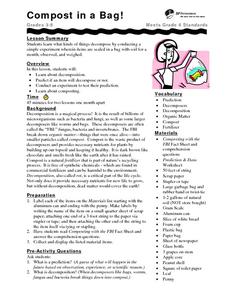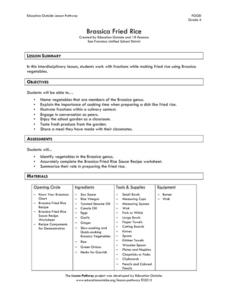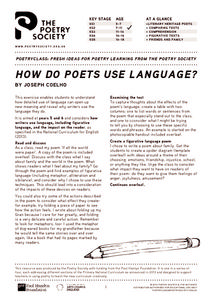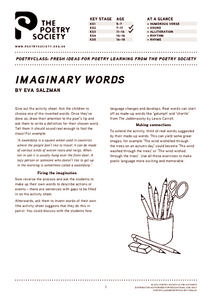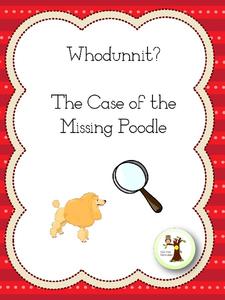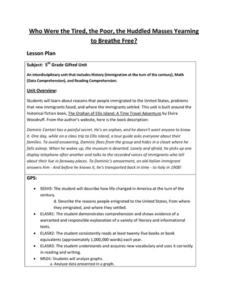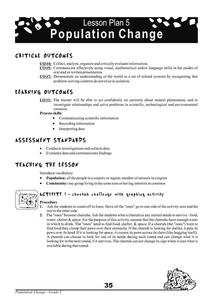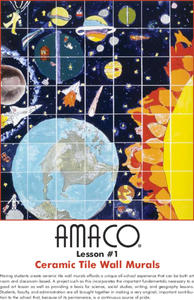Gateways
Teaching the Easter Story
If you are looking for a secular approach to teaching about Easter, this may just be the resource for you. Pupils read a paraphrased text depicting the last supper, arrest, and crucifixion of Jesus Christ as told in the Bible, while also...
Education Outside
Compost in a Bag
Young scientists create a compost bag, predict changes, and after one month, examine the bag to observe the changes that have occurred.
Education Outside
Brassica Fried Rice
Here's a delicious way to engage fourth graders into working with fractions. Kids chop brassica or cruciferous vegetables, measure the required ingredients, and add them to cooked rice to produce a delicious treat.
Kentucky Educational Television
What Is Honesty?
This is an absolute must-have resource for exploring honesty with your learners! Youngsters role play four scenarios that involve honest and dishonest actions, and then engage in meaningful discussion and activities regarding those...
NOAA
A Moving Crust
Young scientists piece together the geological puzzle that is the earth in the third and final lesson of this earth science series. With the help of numerous multimedia resources and a series of engaging hands-on activities, students...
STEM for Teachers
Tsunami!
How does the depth of an ocean affect the speed of a tsunami's waves? Use Jell-o, graham crackers, and marshmallows to model the effects of an underwater earthquake and its resulting tsunami. The lesson includes hands-on activities,...
Growing Classroom
Space Travelers
Groups of three scientists from the rocky planet Zog investigate the composition of soil so that they can take the information back to their home, create soil there, and begin to grow food.
Crafting Freedom
Harriet Jabocs and Elizabeth Keckly: The Material and Emotional Realities of Childhood in Slavery
Through the journals written by Harriet Jacobs and Elizabeth Keckly, young readers gain insight into the lives of two enslaved children on nineteenth-century plantations.
Project Noah
Writing Goes Wild
Young scientists develop their observation and writing skills as they craft and then post a detailed description of a plant or animal they have spotted and photographed.
Briscoe Center for American History
Mary Maverick and Texas History - Part 2
To conclude their investigation of the life of Mary Maverick and to demonstrate their ability to analyze primary source documents, groups use the SOAPS questioning method to examine Maverick's account of events in early Texas history.
Briscoe Center for American History
Mary Maverick and Texas History - Part 1
What's the difference between a diary and a memoir? Young historians explore the ramifications of this question as they learn how to use primary source materials to gain an understanding of life on the Texas frontier.
Briscoe Center for American History
Applying the SOAPS Method of Analyzing Historical Documents
Young historians use the SOAPS (Speaker, Occasion, Audience, Purpose, Subject) method of questioning to determine the historical value of primary source documents. The third in a series of five lessons that model for learners how...
Scholastic
Step-by-Step Strategies for Teaching Expository Writing
A carefully crafted, logically organized, 128-page packet is an excellent addition to your unit on expository writing.
Poetry Class
Eccentricity and Sound
What do Lady Gaga and Dame Edith Sitwell have in common? As they examine Sitwell's poetry, class members learn that the similarities are far more than their unique appearance.
Poetry Society
How do Poets Use Language?
Why do writers choose the language they do? Here's a resource that has the poet himself answer that very question. Joseph Coelho explains why he chose the words and images he used in his poem, "If All the World Were Paper."
Poetry Society
Simile and Metaphor
Young poets use word cards to prompt a metaphor poem comparing to very dissimilar items.
Poetry Society
A Conceit Poem
Young writers needn't be self-involved to craft a conceit. Directions for how to craft this form of extended metaphor, models, and a worksheet are all included in the packet.
Poetry Society
Imaginary Words
Oh, what fun! Young logophiles and neologists create a dictionary-sounding definition for imaginary words and try to fool their classmates.
Tick Tock Curriculum
Whodunnit? The Case of the Missing Poodle
Who purloined the poodle? Class groups read police reports and theorize whodunnit. The sixth of a ten-lesson series on mysteries.
Northeast Georgia Regional Educational Service Agency
Who Were the Tired, the Poor, the Huddled Masses Yearning to Breathe Free?
Elvira Woodruff's The Orphan of Ellis Island: A Time Travel Adventure is the core text in a interdisciplinary unit study of immigration at the turn of the century.
Cheetah Outreach
Population Change
Your youngsters become cheetahs in search of food, water, shelter, and space in a fun physical game that does a fantastic job of representing fluctuating species population based on resources available over years.
HealthTeacher
Get More Sleep
Help learners identify habits that interfere with sleep and to understand the importance of adequate rest and its impact on not only physical health, but also emotional wellbeing.
American Art Clay Co., Inc.
Ceramic Tile Wall Murals
Science, social studies, language arts, and art classes work together with administrators to produce a permanent, ceramic tile wall mural to install at their school.
2012 Teaching Resources
Analyzing Character Traits
Character analysis becomes easy with a 24-page packet packed with mini-lessons, graphic organizers, and activities. A must-have for your curriculum library.



